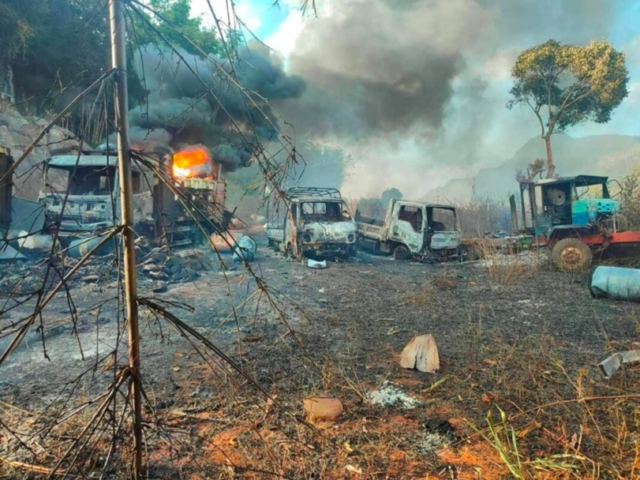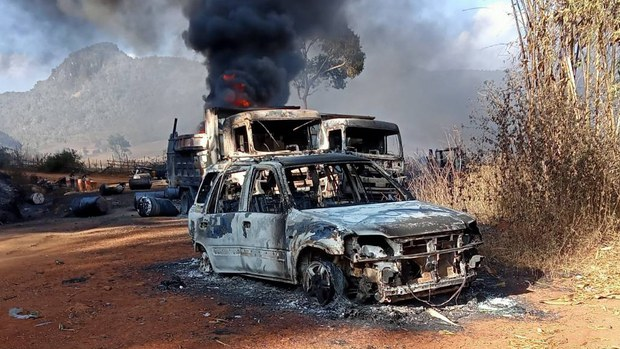An interview with Daw Estelle, who lost her son and daughter in the Moso massacre in Hpruso Township, Karenni (Kayah) State
Kantarawaddy Times conducted an interview with Daw Estelle, who lost her son and daughter in the massacre in which more than 40 people were burnt and killed near Moso village in Hpruso Township, Karenni State on 24 December 2021 – Christmas Eve.
Q: Please introduce yourself first.
A: My name is Estelle. My husband passed away over 10 years ago. My family consists of four members – myself and three children. Two of my children were killed by the military council in Moso. Since then, I have fled and never returned home.
Q: How old were your son and daughter when they were killed in the massacre in Moso?
A: My elder son was 20 years old when he was killed. My younger one was 18 years old. My older child was a girl and the younger one was a boy. We wanted to flee to Loikaw. We thought it would be more peaceful in the city. They went to Loikaw and I stayed behind in the village. Then they were killed by the junta soldiers when they were on their way back to rescue their aunt’s family members and me. My children really did nothing wrong. I think they should file a case. To this day, I can’t forget that day.
Q: Where did you flee and seek shelter after the incident in Moso?
A: We fled all the way to the mountains. First we fled to the mountains and then to the west. Then we thought of fleeing to Loikaw. At that time, my surviving daughter was still in Loikaw. The people there sent her to me so that she couldn’t be arrested. As the roads were blocked, we had to find other ways. It took us the whole day to get to Loikaw. We reached Loikaw only at 6 pm. After 15 days of our stay in Loikaw, heavy fighting broke out. So the sister (a Christian nun) sent us to Taunggyi. When we arrived in Taunggyi, we had nothing to do. And we couldn’t return to our village either. Then we fled to this border area together with others.
Q: What difficulties did you face after your arrival in the border area?
A: There are many difficulties living here. We have no home and nothing to eat, so we face many problems. When we first left the village, we had to rely on our own money and we ran out of it. There were only two of us and there was no one to help us. Some people helped each other, but I didn’t meet anyone who helped me. I was out of luck. They give out rice, but we have to spend a lot of money on curries. We can’t live without eating either. We are not happy living here, but we don’t have a village to go back to. Wherever we stay, we just have to get by. We have been here for a year and a half or almost two years now. We arrived here on 27 April, so it’s been well over a year or almost two years.
Q: What losses did your family suffer after the coup?
A: The biggest loss is my two children. Not only my two children, but also two of my nephews. Four members of our extended family have died. Our car was also among those burned by the junta soldiers. We lost everything. In our village, it is customary to have a house and a farm. At home, we raised chickens, pigs and cattle. I had over 10 cows and a pair of buffaloes. Now I don’t know what happened to them. The house was also destroyed by the junta soldiers. I also had a small store. So I had other things like a fridge and a cupboard. All that was lost too.

Q: How did you find out that your son was burned and killed in the Moso incident?
A: I put things in the bamboo basket and waited a long time for them to come back to pick them up. I waited and waited, not expecting something like this to happen. Someone from our village came and told me that there were gunshots in Moso. I thought maybe something had happened on the small route in Moso, where people come and go, and now there were gunshots. I suspected that my children must have been hit by gunfire. When I looked west towards Moso, I saw it. When I reached the west, there was a big fire and gunshots could be heard.
I climbed up the hill and was still sitting there watching the burning place. I still thought my children hadn’t been burnt. Such a huge fire, they must have just burnt the cars, I still thought. After 6pm people came and said they had been arrested and taken away. I still thought that they were arrested and taken away just like that. I thought about my child, how much he was being tortured now, and kept praying to God. When morning came, everything was known. R esistance comrades picked us up by car so that the families of those burned and killed could come and see the site. My son did nothing wrong, why would they kill innocent people? None of them were armed rebels either. Even if you talk about justice now, there is nothing more to say. Why did this happen? No more justice for us?
Q: As a mother, what would you like to say to the military council that committed this atrocity?
A: I can’t forgive them. As long as I live in this world, I can’t forgive them. I am deeply hurt and scarred in my heart. People have encouraged me to forgive. From a religious point of view, they said it would be better if I forgave. But I asked them: if it was your child who died, could you forgive? I can’t forgive.
Q: What would you like to say for the innocent civilians who were unjustly burned and killed?
A: Until now there is no justice served at all. I want those responsible to look into it and see that justice is done. I just want peace. I don’t want horrible things like this to happen. My children did nothing wrong to deserve to die. I want to ask the one who gave this order: why, for what reason, did they kill innocent people? If such incidents don’t stop, soon there will be no more living people.
Q: What are your wishes?
A: I miss my home very much. Wherever you end up, it’s not the same as your own home. Living in other people’s homes is not the same as living in your own home. I miss my home so much. But I can’t go back. I don’t know if I will be able to go back one day or not. Because I lost my children, even if I go back, I will not be able to live like I used to – that’s my feeling. I can’t think about anything anymore. My heart hurts so much that I feel like even if I go back, I will not be able to find anything meaningful. I am old now and I thought that when my children grew up, they would look after me. But that dream can no longer come true. I want this fight to be over by the end of the year. When it does, I want people to be able to live in peace. These are just my thoughts.
Q: What justice do you want to demand for those killed by the military junta?
A: Please work to ensure that justice is done. It is not just about the killing of one person. More than 40 people were systematically killed en masse. I would like to encourage the young people who are fighting for their nation and state to work for peace.
Q: Is there anything else you would like to say?
A: The war has been going on for years now, and I want this terrible war to finally come to an end. I believe that God will call back my dead children and the others. For me, I can only live on with God. I can never forget this incident, my heart is always distressed. I wish those in power could set up a place for us taking refuge at the border. There should be some humanitarian aid and consideration. That’s the one thing I say to everyone I meet. I don’t know if it’s right or wrong, but my feelings make me keep mentioning it.
Sent by Kantarawaddy Times.

